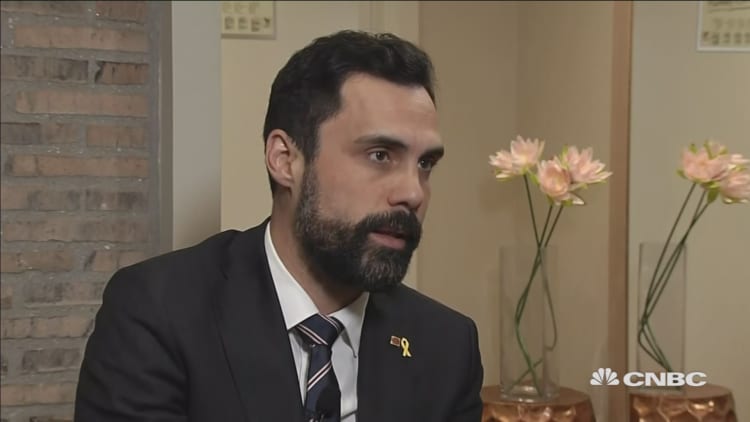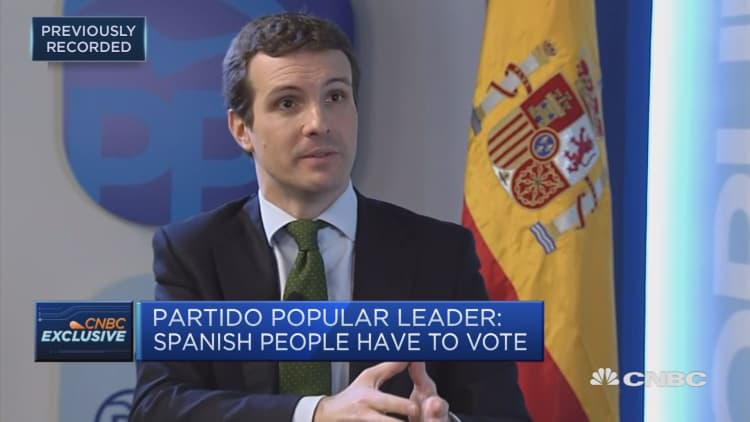
Spanish and Catalan politicians have offered competing versions of why talks between the two sides fell apart, prompting Prime Minister Pedro Sanchez's decision last Friday to call for fresh national elections.
Spain's Trade and Industry Minister Reyes Maroto told CNBC's Willem Marx that Sanchez's Socialist party (PSOE) had embarked on negotiations with Catalan leaders in good faith, hoping to resolve a divisive rift that has overshadowed the country's politics ever since separatists held an unsanctioned independence referendum in October 2017 before unilaterally declaring an independent Catalonia.
"Catalonia is part of our national project," said Maroto, "and we have reached out to the Catalan regional government to try and bring some calm and trust between the two so that Spain can keep creating jobs and also keep its growth levels," he said Thursday.
Madrid's sometimes violent clampdown on the independence movement in late 2017 had sparked large-scale and impassioned demonstrations in Catalonia that have sporadically continued until now.
Direct discussions between the two sides commenced last summer after two small Catalan political parties helped Sanchez seize power in Madrid by voting alongside his PSOE in a parliamentary no-confidence vote that toppled former Prime Minister Mariano Rajoy.
Rajoy, as head of the conservative Partido Popular (PP) that governed Spain for much of the previous decade, had taken a hardline approach to separatist efforts in the wealthy northeast region, and had suspended the power of Catalonia's local government for the eight months prior to his ouster.
After taking his own oath of office, Sanchez promised Catalans his administration would be willing to debate their disagreements within a formal framework of talks.
"We have done all of our dialogue within the Spanish constitution," Maroto insisted. "We have done everything via the tools that the constitution enables us to do, our dialogue has respected the law and the constitution."

The President of Catalonia's restored regional parliament, Roger Torrent, acknowledged that a Socialist government had proved to be a preferable negotiating partner in comparison to its PP predecessor. But he insisted that last summer's Catalan parliamentary votes that ended Rajoy's premiership could not represent a "blank cheque" of support for his successor if he was not prepared to take further concrete action to address the demands of the local legislature in Barcelona.
"It's not enough if those discussions are different in relation to those with the previous government," Torrent said in an interview Thursday.
"It was Prime Minister Sanchez from PSOE who broke off the negotiations and the dialogue between the government and parliamentary majorities."
In a further a blow to relations with the central government, a dozen high-profile Catalan leaders went on trial last week for alleged offences relating to the attempted referendum in late 2017. Spanish prosecutors have charged most of the defendants with either sedition or rebellion.
Torrent had traveled from the Catalan capital, Barcelona, to attend the trial in Madrid this week, and told CNBC that the judicial process was an affront to freedom of speech.
He also echoed several other Catalan politicians who have expressed concern that a far-right party, Vox, which won several seats in Andalusia's regional assembly after local elections in December, could begin to influence Spain's more mainstream conservative parties and entrench any future government's anti-separatist stance.

Pablo Casado, Rajoy's successor as PP chief, allows that Catalonia is a complex problem, but said it had been "irresponsible" of Sanchez to initiate talks with pro-independence parties in the first place.
He told CNBC Thursday that he would reinstate then retain central government control of Catalonia's local affairs for as long as the separatists continued with their efforts to "break the unity of Spain."

